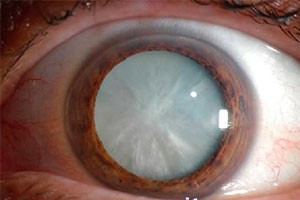

A cataract is a clouding of the normally clear lens of your eye. For people who have cataracts, seeing through cloudy lenses is a bit like looking through a frosty or fogged-up window.
Clouded vision caused by cataracts can make it more difficult to read, drive a car (especially at night) or see the expression on a friend's face.
Most cataracts develop slowly and don't disturb your eyesight early on. But with time, cataracts will eventually interfere with your vision.
Sings and symptoms
Signs and symptoms of cataracts include:
At first, the cloudiness in your vision caused by a cataract may affect only a small part of the eye's lens and you may be unaware of any vision loss. As the cataract grows larger, it clouds more of your lens and distorts the light passing through the lens. This may lead to signs and symptoms you're more likely to notice.
Causes
Most cataracts develop when aging or injury changes the tissue that makes up your eye's lens.
Some cataracts are related to inherited genetic disorders that cause other health problems and increase your risk of cataracts. Cataracts can also be caused by other eye conditions, medical conditions such as diabetes, trauma or past eye surgery. Long-term use of steroid medications, too, can cause cataracts to develop.
Treatment
The only effective treatment for cataracts is surgery.
What happens during cataract surgery?
Cataract surgery involves removing the clouded lens and replacing it with a clear artificial lens. The artificial lens, called an intraocular lens, is positioned in the same place as your natural lens, and it remains a permanent part of your eye.
For some people, other eye problems prohibit the use of an artificial lens. In these situations, once the cataract is removed, vision may be corrected with eyeglasses or contact lenses.
Cataract surgery is generally done on an outpatient basis, which means you won't need to stay in a hospital after the surgery.
During cataract surgery, your eye doctor uses local anesthesia to numb the area around your eye, but you usually stay awake during the procedure.
